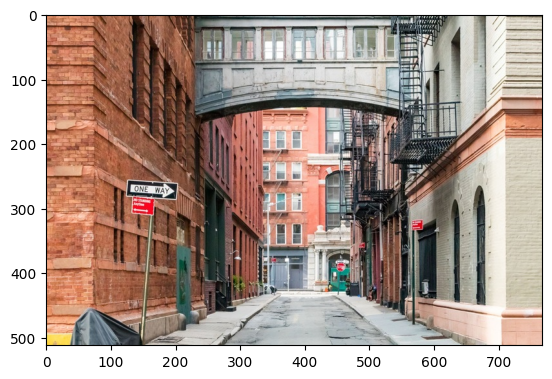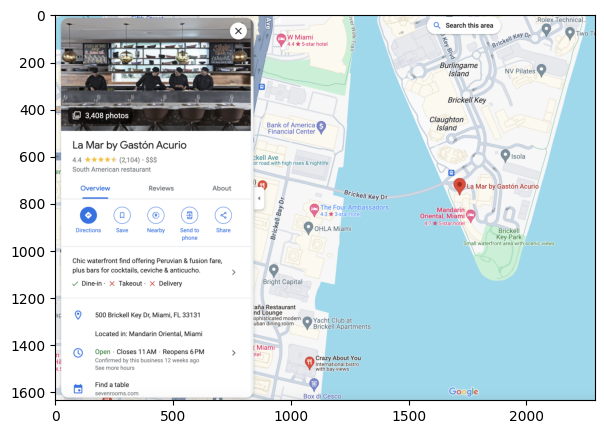Multi-Modal LLM using Google’s Gemini model for image understanding and build Retrieval Augmented Generation with LlamaIndex#
In this notebook, we show how to use Google’s Gemini Vision models for image understanding.
First, we show several functions we are now supporting for Gemini:
complete(both sync and async): for a single prompt and list of imageschat(both sync and async): for multiple chat messagesstream complete(both sync and async): for steaming output of completestream chat(both sync and async): for steaming output of chat
For the 2nd part of this notebook, we try to use Gemini + Pydantic to parse structured information for images from Google Maps.
Define the desired Pydantic class with attribution fields
Let
gemini-pro-visionmodel understand each image and output structured results
For the the 3rd part of this notebook, we propose using Gemini & LlamaIndex to build a simple Retrieval Augmented Generation Flow for a small Google Maps restaurant dataset.
Build vector index based on the structured outputs from Step 2
Using the
gemini-promodel to synthesize the results and recommends restaurants based on user query.
Note: google-generativeai is only available for certain countries and regions.
!pip install llama-index 'google-generativeai>=0.3.0' matplotlib qdrant_client
Use Gemini to understand Images from URLs#
%env GOOGLE_API_KEY=...
import os
GOOGLE_API_KEY = "" # add your GOOGLE API key here
os.environ["GOOGLE_API_KEY"] = GOOGLE_API_KEY
Initialize GeminiMultiModal and Load Images from URLs#
from llama_index.multi_modal_llms.gemini import GeminiMultiModal
from llama_index.multi_modal_llms.generic_utils import (
load_image_urls,
)
image_urls = [
"https://storage.googleapis.com/generativeai-downloads/data/scene.jpg",
# Add yours here!
]
image_documents = load_image_urls(image_urls)
gemini_pro = GeminiMultiModal(model_name="models/gemini-pro-vision")
from PIL import Image
import requests
from io import BytesIO
import matplotlib.pyplot as plt
img_response = requests.get(image_urls[0])
print(image_urls[0])
img = Image.open(BytesIO(img_response.content))
plt.imshow(img)
https://storage.googleapis.com/generativeai-downloads/data/scene.jpg
<matplotlib.image.AxesImage at 0x2a0699ed0>

Complete a prompt with a bunch of images#
complete_response = gemini_pro.complete(
prompt="Identify the city where this photo was taken.",
image_documents=image_documents,
)
print(complete_response)
New York City
Steam Complete a prompt with a bunch of images#
stream_complete_response = gemini_pro.stream_complete(
prompt="Give me more context for this image",
image_documents=image_documents,
)
for r in stream_complete_response:
print(r.text, end="")
This is an alleyway in New York City. It is between two tall buildings and there is a bridge going over the alleyway. The buildings are made of red brick and there are fire escapes on the buildings. The alleyway is empty except for a few trash cans.
Async Complete#
response_acomplete = await gemini_pro.acomplete(
prompt="Describe the images as an alternative text",
image_documents=image_documents,
)
print(response_acomplete)
Async Steam Complete#
response_astream_complete = await gemini_pro.astream_complete(
prompt="Describe the images as an alternative text",
image_documents=image_documents,
)
async for delta in response_astream_complete:
print(delta.text, end="")
Complete with Two images#
image_urls = [
"https://www.sportsnet.ca/wp-content/uploads/2023/11/CP1688996471-1040x572.jpg",
"https://res.cloudinary.com/hello-tickets/image/upload/c_limit,f_auto,q_auto,w_1920/v1640835927/o3pfl41q7m5bj8jardk0.jpg",
# "https://www.cleverfiles.com/howto/wp-content/uploads/2018/03/minion.jpg",
]
image_documents_1 = load_image_urls(image_urls)
response_multi = gemini_pro.complete(
prompt="is there any relationship between those images?",
image_documents=image_documents_1,
)
print(response_multi)
2nd Part: Gemini + Pydantic for Structured Output Parsing from an Image#
Leveraging Gemini for the image reasoning
Use Pydantic program to generate structured output from the image reasoning results of Gemini
import google.generativeai as genai
genai.configure(
api_key=GOOGLE_API_KEY,
client_options={"api_endpoint": "generativelanguage.googleapis.com"},
)
List available Gemini Models from google.generativeai.
Make sure your API key has access to belowing models
for m in genai.list_models():
if "generateContent" in m.supported_generation_methods:
print(m.name)
models/gemini-pro
models/gemini-pro-vision
Download example images for Gemini to understand#
from pathlib import Path
input_image_path = Path("google_restaurants")
if not input_image_path.exists():
Path.mkdir(input_image_path)
!wget "https://docs.google.com/uc?export=download&id=1Pg04p6ss0FlBgz00noHAOAJ1EYXiosKg" -O ./google_restaurants/miami.png
!wget "https://docs.google.com/uc?export=download&id=1dYZy17bD6pSsEyACXx9fRMNx93ok-kTJ" -O ./google_restaurants/orlando.png
!wget "https://docs.google.com/uc?export=download&id=1ShPnYVc1iL_TA1t7ErCFEAHT74-qvMrn" -O ./google_restaurants/sf.png
!wget "https://docs.google.com/uc?export=download&id=1WjISWnatHjwL4z5VD_9o09ORWhRJuYqm" -O ./google_restaurants/toronto.png
Define the Pydantic Class for the Structured Parser#
from pydantic import BaseModel
from PIL import Image
import matplotlib.pyplot as plt
class GoogleRestaurant(BaseModel):
"""Data model for a Google Restaurant."""
restaurant: str
food: str
location: str
category: str
hours: str
price: str
rating: float
review: str
description: str
nearby_tourist_places: str
google_image_url = "./google_restaurants/miami.png"
image = Image.open(google_image_url).convert("RGB")
plt.figure(figsize=(16, 5))
plt.imshow(image)
<matplotlib.image.AxesImage at 0x293e35210>

Call the Pydantic Program and Generate Structured Output#
from llama_index.multi_modal_llms import GeminiMultiModal
from llama_index.program import MultiModalLLMCompletionProgram
from llama_index.output_parsers import PydanticOutputParser
prompt_template_str = """\
can you summarize what is in the image\
and return the answer with json format \
"""
def pydantic_gemini(
model_name, output_class, image_documents, prompt_template_str
):
gemini_llm = GeminiMultiModal(
api_key=GOOGLE_API_KEY, model_name=model_name
)
llm_program = MultiModalLLMCompletionProgram.from_defaults(
output_parser=PydanticOutputParser(output_class),
image_documents=image_documents,
prompt_template_str=prompt_template_str,
multi_modal_llm=gemini_llm,
verbose=True,
)
response = llm_program()
return response
Generate the Pydantic Structured Output via Gemini Vision Model#
from llama_index import SimpleDirectoryReader
google_image_documents = SimpleDirectoryReader(
"./google_restaurants"
).load_data()
results = []
for img_doc in google_image_documents:
pydantic_response = pydantic_gemini(
"models/gemini-pro-vision",
GoogleRestaurant,
[img_doc],
prompt_template_str,
)
# only output the results for miami for example along with image
if "miami" in img_doc.image_path:
for r in pydantic_response:
print(r)
results.append(pydantic_response)
('restaurant', 'La Mar by Gaston Acurio')
('food', 'South American')
('location', '500 Brickell Key Dr, Miami, FL 33131')
('category', 'Restaurant')
('hours', 'Open ⋅ Closes 11 PM')
('price', 3.0)
('rating', 4)
('review', '4.4 (2,104)')
('description', 'Chic waterfront find offering Peruvian & fusion fare, plus bars for cocktails, ceviche & anticucho.')
('nearby_tourist_places', 'Brickell Key Park')
Observation:
Gemini perfectly generates all the meta information we need for the Pydantic class
It could also recognizes the nearby park from
Google Maps
3rd Part: Build Multi-Modal RAG for Restaurant Recommendation#
Our stack consists of Gemini + LlamaIndex + Pydantic structured output capabilities
Construct Text Nodes for Building Vector Store. Store metadata and description for each restaurant.#
from llama_index.schema import TextNode
nodes = []
for res in results:
text_node = TextNode()
metadata = {}
for r in res:
# set description as text of TextNode
if r[0] == "description":
text_node.text = r[1]
else:
metadata[r[0]] = r[1]
text_node.metadata = metadata
nodes.append(text_node)
Using Gemini Embedding for building Vector Store for Dense retrieval. Index Restaurants as nodes into Vector Store#
from llama_index import VectorStoreIndex, StorageContext, ServiceContext
from llama_index.embeddings import GeminiEmbedding
from llama_index.llms import Gemini
from llama_index.vector_stores import QdrantVectorStore
from llama_index import StorageContext
import qdrant_client
# Create a local Qdrant vector store
client = qdrant_client.QdrantClient(path="qdrant_gemini_3")
vector_store = QdrantVectorStore(client=client, collection_name="collection")
# Using the embedding model to Gemini
embed_model = GeminiEmbedding(
model_name="models/embedding-001", api_key=GOOGLE_API_KEY
)
service_context = ServiceContext.from_defaults(
llm=Gemini(api_key=GOOGLE_API_KEY), embed_model=embed_model
)
storage_context = StorageContext.from_defaults(vector_store=vector_store)
index = VectorStoreIndex(
nodes=nodes,
service_context=service_context,
storage_context=storage_context,
)
Using Gemini to synthesize the results and recommend the restaurants to user#
query_engine = index.as_query_engine(
similarity_top_k=1,
)
response = query_engine.query(
"recommend a Orlando restaurant for me and its nearby tourist places"
)
print(response)
For a delightful dining experience, I recommend Mythos Restaurant, known for its American cuisine and unique underwater theme. Overlooking Universal Studios' Inland Sea, this restaurant offers a captivating ambiance. After your meal, explore the nearby tourist attractions such as Universal's Islands of Adventure, Skull Island: Reign of Kong, The Wizarding World of Harry Potter, Jurassic Park River Adventure, and Hollywood Rip Ride Rockit, all located near Mythos Restaurant.